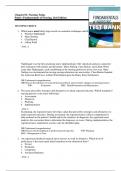Prüfung
Test Bank For Fundamentals of Nursing 11th Edition Potter Perry Chapter 1-50 |Newest Version with Complete 100% Answers
- Kurs
- Hochschule
- Book
Nightingale was the first practicing nurse epidemiologist. Her statistical analyses connected poor sanitation with cholera and dysentery. Mary Nutting, Clara Barton, and Lillian Wald came after Nightingale, each contributing to the nursing profession in her own way. Mary Nutting was instrumental in...
[ Mehr anzeigen ]



